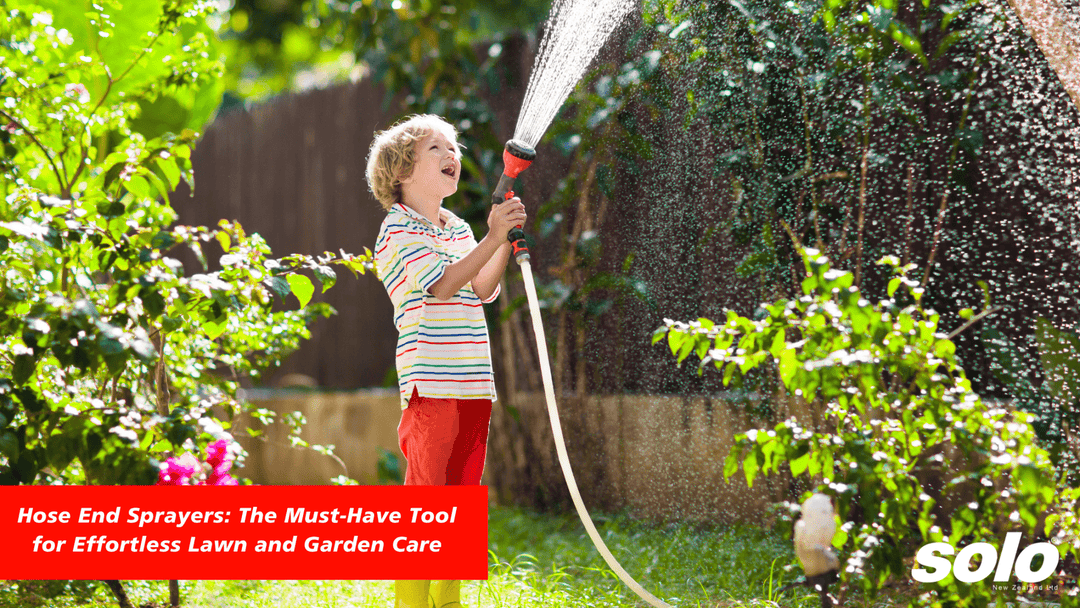Maximising efficiency with Solo sprayers for Kiwi homeowners
Owning a lifestyle property in New Zealand is a dream many of us Kiwis have. It's a perfect blend of rural charm and modern conveniences. But let's be real – maintaining such a property isn't a walk in the park. You need the right tools to keep your land looking sharp and productive. Enter Solo sprayers – a reliable brand for anyone serious about property upkeep. Here's how you can get the most out of your Solo sprayer:
Getting to know your Solo sprayer
First things first, Solo sprayers come in a range of models. You’ve got handheld units, backpack versions, and even larger wheeled ones. Each type has its own use, whether you’re dealing with herbicides, pesticides, or fertilisers. Picking the right model boils down to the size of your property and what you need to tackle – be it your garden, orchard, or pasture.
Prepping your sprayer
Pick the right nozzle: This is key. Different nozzles do different jobs. Flat fan nozzles are great for herbicides, cone nozzles for insecticides, and adjustable ones for precision tasks. The right nozzle ensures even coverage and cuts down on waste.
Mix chemicals properly: Always read the labels and stick to the instructions when mixing chemicals. Using the right concentration is crucial – it ensures effectiveness and protects your plants and the environment.
Calibrate your sprayer: Calibration is a must. This means adjusting the pressure and making sure your sprayer delivers the right amount of solution per square metre. Regular calibration checks can save you both time and resources.
Spraying techniques
Timing is everything: Spraying is all about timing. Apply herbicides early in the morning or late in the afternoon when the wind is calm and temperatures are cooler. This reduces evaporation and drift, making sure the chemicals hit their target.
Keep it consistent: When you’re spraying, move at a steady pace and keep the same distance from the plants. This ensures even coverage and prevents over or under-application.
Overlap your spray: To avoid missed spots, overlap your spray patterns slightly. This is especially important for larger areas where getting uniform coverage can be tricky.
Maintenance is key: Keep your sprayer in top shape with regular maintenance. Clean the tank, nozzles, and filters after each use to prevent clogging and corrosion. Check for leaks and worn parts, and replace them as needed.
Staying safe
Suit up: Always wear gloves, long sleeves, eye protection, and a mask when handling and spraying chemicals. Safety first, mate.
Store chemicals right: Keep chemicals in their original containers and store them in a locked, well-ventilated area away from kids and pets. Label everything clearly to avoid accidents.
Proper disposal: Dispose of any leftover chemicals and containers responsibly. Follow local regulations to make sure you’re not harming the environment.
Adapting to New Zealand conditions
Mind the weather: NZ weather can be unpredictable. Check the forecast before you spray. Rain can wash away chemicals, and strong winds can cause drift, leading to uneven application and potential harm to non-target plants.
Seasonal adjustments: Adjust your spraying schedule according to the seasons. For example, early spring is ideal for pre-emergent herbicides, while late summer might be better for pest control.
Know your soil and plants: Different regions in New Zealand have varying soil types and plant species. Tailor your spraying strategy to your specific property, considering the local flora and fauna.
Solo sprayers are a must-have for any Kiwi lifestyle property owner who’s serious about keeping their land in top shape. By picking the right sprayer, prepping it properly, using effective techniques, and following safety precautions, you can maximise your spraying efficiency. Adapt your approach to New Zealand's unique conditions, and you’ll ensure your property thrives, providing a beautiful and productive environment for years to come.
Cheers to a well-kept slice of paradise!




















Leave a comment